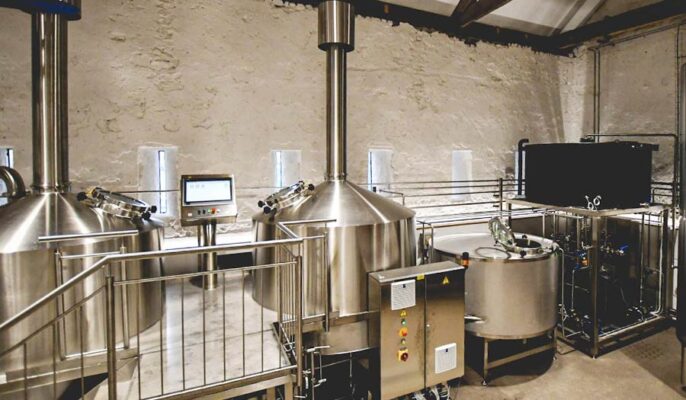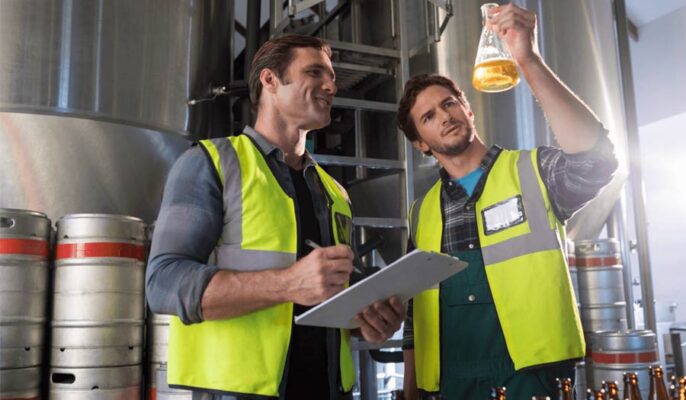The brewing industry is like a science, requiring specialized ingredients, rigorous temperatures, well-maintained machinery, aggressive chemicals and the utmost in safety. A brewery can be a dangerous place. Maintaining equipment security is critical not only to the success of your business, but also to your employees. Today, the engineer will talk to you about tips for brewery maintenance and safe operation.
Keep the kettle clean
Cleaning is an important aspect of maintaining small brewery equipment. Proper cleaning helps remove any residue or buildup that may affect the quality of your beer. There are various types of cleaners available, such as acidic and alkaline, that can be used to clean different types of equipment. It is important to clean your equipment to prevent contamination and ensure optimal brewing conditions.
Having a clean kettle is crucial to craft beer production. Preventive cleaning helps save time and money by keeping your brewing process running . It’s a good idea to inspect the drainpipe, pump and steam jacket every two weeks to help detect any problems.

Choose the right heating source
There are many factors to consider when choosing a heating source for a kettle or HLT [hot liquid tank]. System size, available space, desired flavor impact, heating time, and of course money will be some of the factors.
There are three ways to heat a kettle or HLT. The old traditional way is to use a natural gas burner [direct fire] to heat the liquid from the bottom. A more modern approach used by most breweries today is a steam jacket. The third and most effective method is to use a shell and tube heat exchanger.
Optimize spare parts management
It’s important to have the spare parts you need to repair any malfunction and . An optimized spare parts management system is easy to install and provides you with the level of security you need to ensure plant efficiency. To find the proper balance of spare parts in stock, you perform an ABC analysis, classifying them as follows. Category A spare parts are very important spare parts and so need to be stocked on site. Grade B are spare parts of average importance that your brewing system supplier or service company should keep in stock for delivery on short notice. Finally, Category C is a non-critical spare part for which a lead time of a few weeks is acceptable. For the latter, we recommend weekly inspections to detect possible damage to component C on time.
Employee safety training
Developing and implementing a comprehensive workplace transportation safety plan can help expose and control risks. When new people come into a brewery, they need to receive proper safety training. It is very important to explain safety knowledge to employees. There are many beer-making equipments in craft breweries, and each equipment adopts fixed operating methods. You need to train new employees on the operation of the relevant equipment before they can start brewing beer. Also, craft breweries can also be counted as food processing producers. They need cleanliness during the brewing process and employee clothing needs to be managed. For example, when and where you need to wear protective eyewear, and what to watch out for when working with chemicals.
Boiler repair
Steam generators are used in breweries in many large pubs and small breweries. When talking about replacing a boiler, the cost of not maintaining your steam system can be very high. Many brewers have expensive monthly maintenance contracts and hundreds of dollars in boiler chemicals to maintain their boilers.
In fact, the easiest way to maintain your boiler is to fix steam and condensate leaks. The boiler should be a semi-closed system, using distilled water once the condensate has passed through the steam system once. Every drop of water that leaks on the floor or every puff of steam that comes out of a leaking vacuum breaker must be replaced with city water rich in oxygen and chlorine. This is the biggest factor leading to boiler rot.

Transportation safety
In a brewery, workers are always around forklifts. This can create a false sense of security as they feel they know what the “traffic flow” is like. Make sure there are clear signs marking the location of forklifts and pedestrian traffic. Use physical barriers if necessary. Check all forklifts to make sure lights and sirens are in good working order. Encourage verbal communication between forklift operators and pedestrians. Use reflective tape and high-visibility vests to increase visibility in your warehouse.
Keep the hose clean
If not cleaned , rubber hoses can become a perfect home for a variety of bacteria. Make sure all fittings are fastened and check for any holes or cracks that could allow moisture to enter, as bacteria love moisture. This is very important for all hoses to be up to standard.
In conclusion
Maintaining brewery equipment is critical to producing high-quality beer and avoiding potential safety hazards. Proper cleaning helps remove residue and prevent contamination, while lubrication extends the life of your equipment. Regular maintenance and preventive inspections can help avoid common problems like leaks and low pressure. By following best practices, you can ensure your small brewery equipment is in top condition, produce high-quality beer, and avoid costly equipment repairs.




